Colin Kaepernick: Netflix drama follows the birth of a protest figurehead
- Published

Jaden Michael plays the young Colin Kaepernick in Colin In Black and White
When American football star Colin Kaepernick took the knee during a national anthem, he became an overnight symbol of the protest and division over race in the US. He has now worked with Netflix to show what set a sport-mad teenager on the path to becoming a civil rights standard bearer.
When the young Kaepernick first explored and expressed his black identity, he did so through his hairstyle.
Before the distinctive afro, he got cornrows then braids in high school - but soon found that something as seemingly innocuous as hair could raise strong opinions and opposition.
That's how the story is told in the first episode of Colin In Black and White, a bio-series telling the origin story of Kaepernick, before he became a star quarterback and then a modern-day protest figurehead after taking the knee in 2016.
In the show, his hairstyle is a symbol of the challenges the young Kaepernick had to overcome, and which helped form the personality of the man who stood up to - or rather, didn't stand up to - the might of the US anthem and establishment.
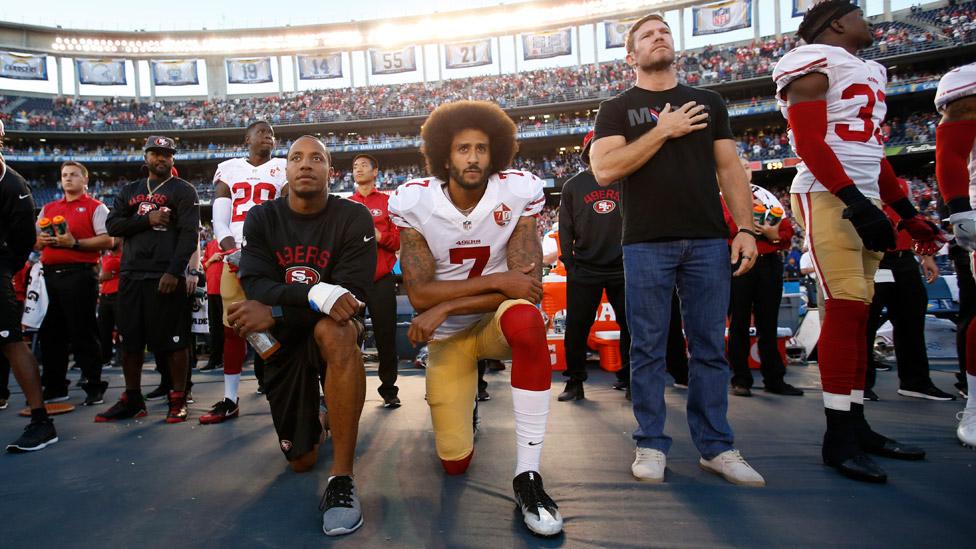
Kaepernick (centre) hit the headlines when he first took the knee in 2016
"He wanted to focus on his teenage years," says Ava DuVernay, the Oscar-nominated director who co-created the series with Kaepernick.
"I was interested in accepting the challenge and focusing on that because I thought, through focusing just on the teenage years, we can get a glimpse into the foundation of this person who's become very writ large on our culture around the world.
"The foundational elements of becoming who you are, the making of a singular American icon, the making of a justice warrior - what are the things that make that up?
"And really it's the small things."
The six-part series, which landed on Netflix on Friday, contains a string of relatively small things that are presented as being significant in hindsight.

The young Kaepernick stands for the national anthem in the series
Kaepernick must accept and assert his identity in a white-dominated community and a white adoptive family; he must battle coaches who overlook his talent for no apparent reason; and deal with prejudice from hotel managers and police.
"Through looking at his early life, we can see someone who really listened to their own voice, who really trusted their own power at every turn," DuVernay continues.
"There were points where he had to go against the tide. So you really see how each of those moments equals the person who we have now."
DuVernay interviewed Kaepernick about his youth to settle on the storylines. Despite the real Kaepernick's close involvement in the series, its 18-year-old star Jaden Michael says he "didn't spend a lot of time" with the man he's portraying.
"We had a few meetings and we met each other after production," the actor says.
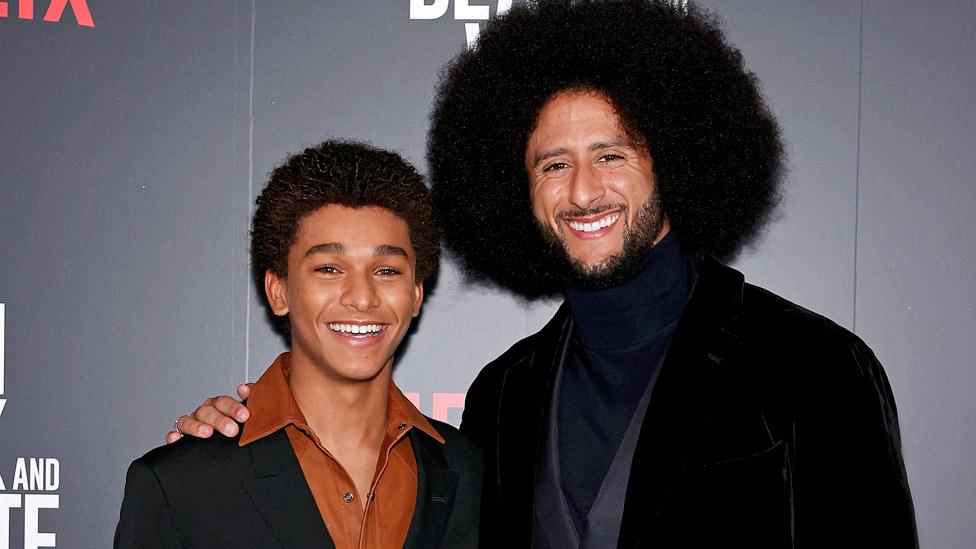
Michael says playing Kaepernick taught him "the power of being mind-strong"
"I think the important part was to separate the Colin that we know today and young Colin, because those are two very different people.
"And the story really isn't about, why did Colin take a knee? It's about, why would someone take a knee? What are the situations that would put a young person onto a path where they would be the rebel and leader to take a knee in the future?"
The coming-of-age drama is a big break for its young star, who DuVernay describes as "truly a brilliant actor".
Michael says he knows what it's like to have to prove yourself when you're starting out - himself in acting, as Kaepernick did in sport.

The real Kaepernick watches his fictionalised younger self in the series
"I learned a lot about being someone who's dedicated and the power of being mind-strong, I guess," the actor says.
"That's what Colin was. He was very dedicated, through everyone telling him no, through everyone telling him that he could not, that he was not worth the bill.
"That's something that I'm not unfamiliar to. I'm used to hearing that. So to know that if you keep pushing forward, there's an opportunity for you somewhere, that was the main takeaway."
While its makers say the series shows what formed Kaepernick's personality, it isn't the full story. There is a big gap - a decade - between the events the series depicts and the San Francisco 49ers quarterback's first protest against the oppression of black people and police brutality.
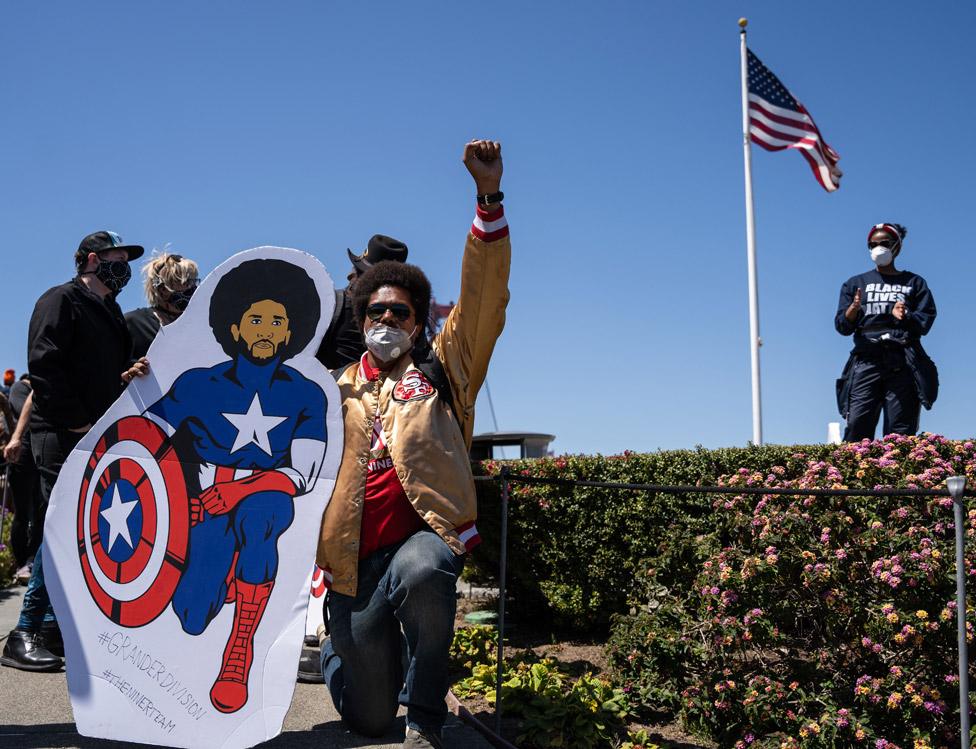
A Black Lives Matter protester with a picture of Colin Kaepernick in a Captain America costume in June 2020
That act sparked waves of support, soul-searching and ire in the US.
It made him a hero to many. "I kind of fell in love," recalls Michael, who was around 13 at the time.
But Donald Trump - then a presidential candidate - urged Kaepernick to "find a country that works better for him".
The NFL said it would fine teams whose players did not stand for the Star-Spangled Banner. Kaepernick himself left the 49ers and has never found a new team.
Taking the knee became a symbol of opposition to discrimination around the world. But it remains highly contentious.
This week, South African cricketer Quinton de Kock pulled out of a T20 World Cup match after refusing to take the knee, and some England fans booed when their players made the gesture this summer.
Kaepernick, now 33, narrates the episodes Wonder Years-style, and occasionally appears on screen to wander through a viewing gallery of his life and offer thoughts about his younger self.
DuVernay, known for Selma and When They See Us, was afraid that, because he's not a trained actor, he would be "a hot mess" to direct. But his football training stood him in good stead.
"He has this incredible organised mind because he was an NFL quarterback, so he has hundreds of plays in his head," she says, referring to the strategies players memorise.
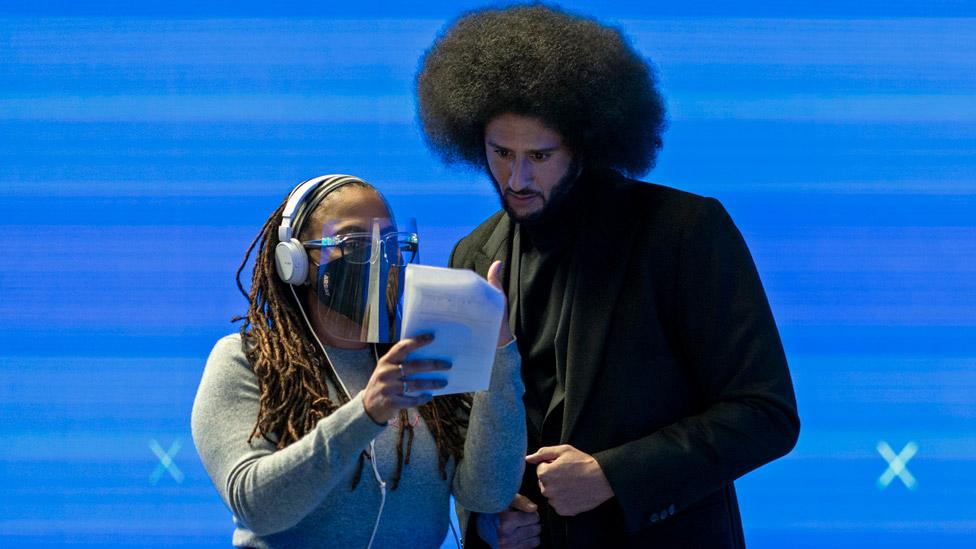
Ava DuVernay co-created the series and directed the first episode
"I was like, 'Colin you're gonna walk here, and on this line could you just hit that mark?' I was thinking that might be too much for this guy. He's like, 'Oh is that all?'
"By the end of it, I had plays and blocking and we were just having fun with it because he was so good at it. He's really good at being himself in the everyday, so that translated to being himself on screen."
The director has even hooked him up with an acting coach because "I think he's got the vibe".
"If there's ever a black John Wick script out there that he wants to collaborate on, just give me a ring, because that could be fun," she laughs.
So a show about the first chapter of his career may open the door to a new one in acting.
But his most memorable act will be the simple stance for which he wrote the playbook.
- Attribution
- Published29 June 2020
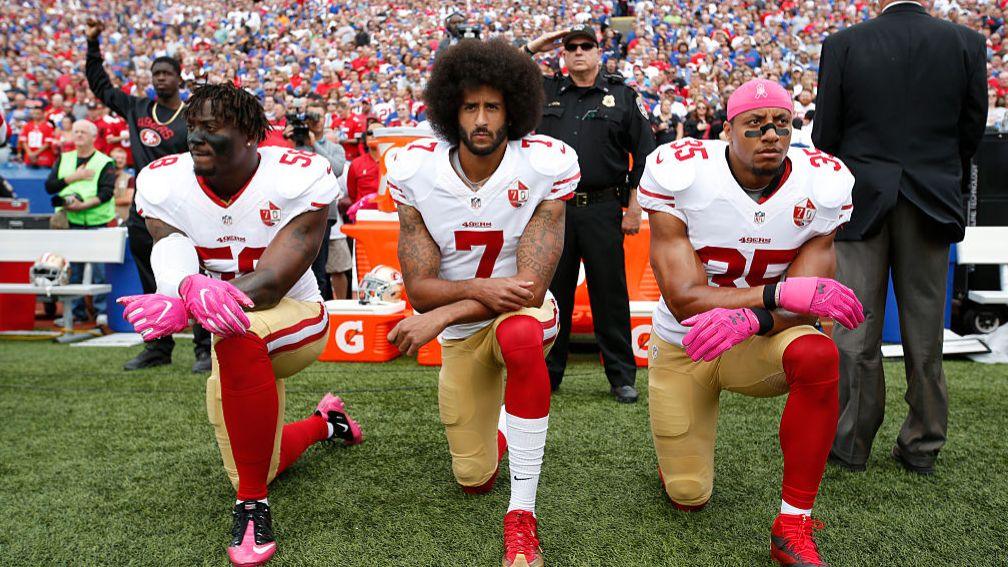
- Attribution
- Published6 June 2020
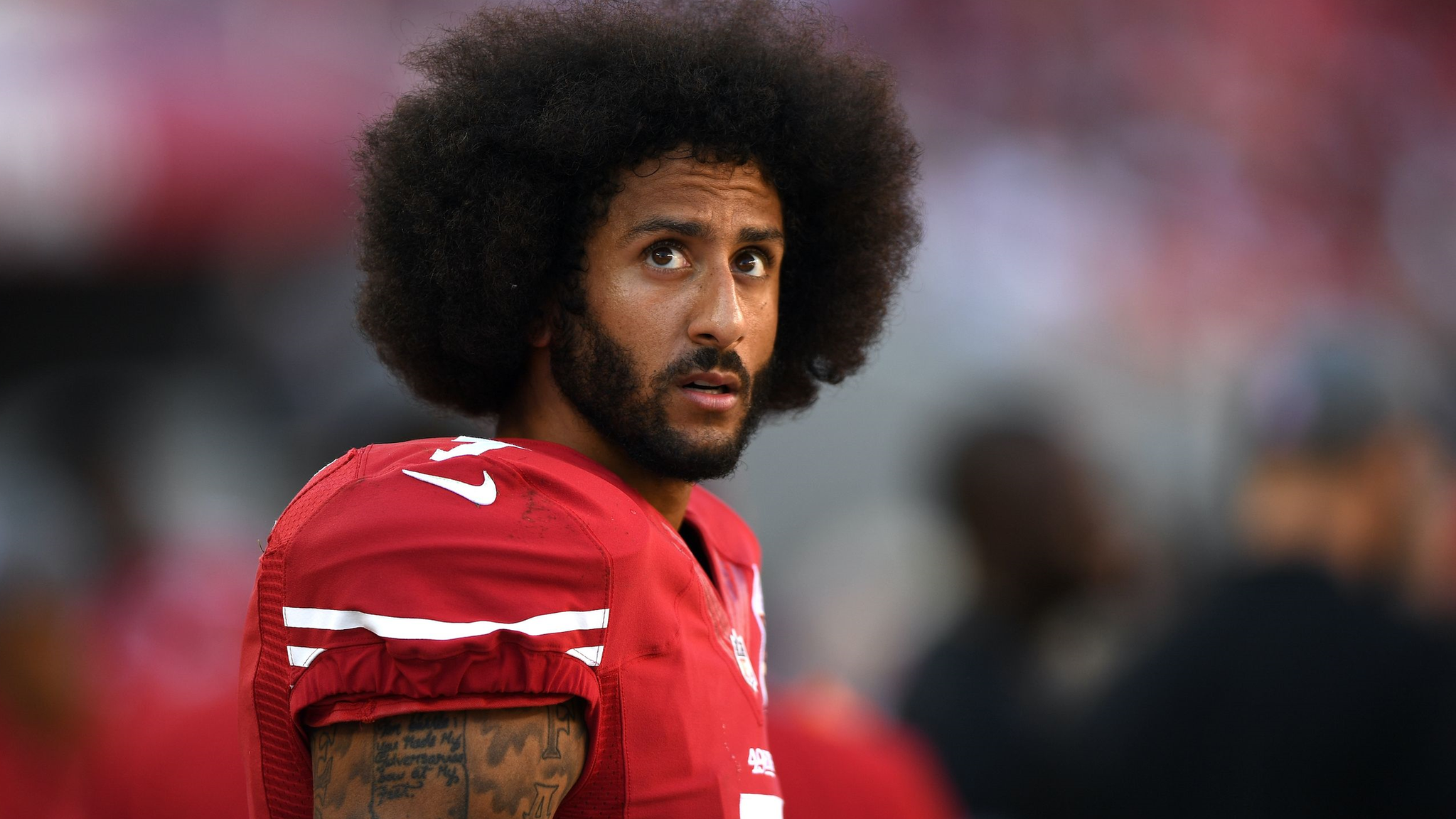
- Attribution
- Published11 October 2017
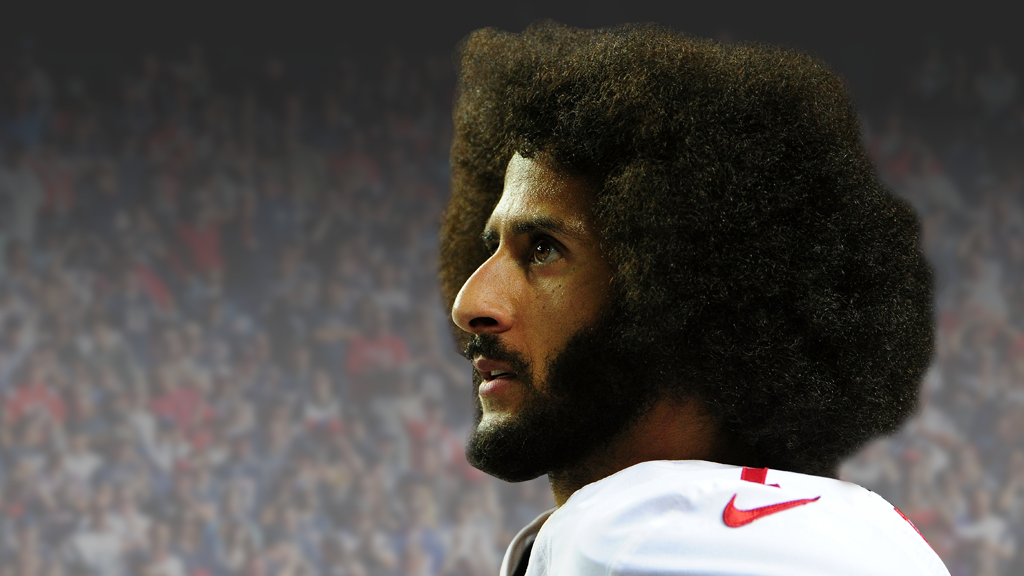
- Published21 November 2022
